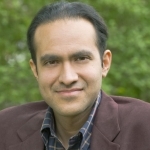
Visit: Remembering 9/11
(HOST) In considering the 10th Anniversary of the 9/11 terror attacks, commentator and UVM Professor Saleem Ali wonders how we might prevent terror attacks from derailing peace processes.
(ALI) Earlier this year I was in Lahore, Pakistan as one of the organizers of a forum on environmental cooperation between India and Pakistan. This was a unique gathering of professionals and politicians. For the first time we had a delegation of three Indian members of parliament cross over to the Pakistani side along with a notable Indian TV anchor to have a public debate with students on Indo-Pak cooperation potential.
A few days after this auspicious event, we were saddened to learn of another string of terrorist attacks in Mumbai, India . There was immediately a sinking feeling for us as organizers, knowing all too well how any terrorist attack mars peace-building efforts. Questions were immediately raised. Was Pakistan involved? What signals should India send across the border regarding upcoming meetings between the two governments? Whose side would the United States be on? There was general consensus that peace would be on hold.
It is a tragic sign of our times that the concept of peace-building has become synonymous with a kind of hollow idealism. Yet without peace countries squander millions on senseless arms races that detract from development. Technological advancement is also of no avail if people’s lives are constantly threatened. Hence any effort for peace-building must be greeted with measured optimism rather than cynical pessimism. We must also recognize that terrorists always want to derail peace processes, and countries need to develop resilience and a measured response when it comes reacting to such provocations.
As we approach the tenth anniversary of September 11, all Americans must consider how our response to a tragedy has also changed the lives of so many of our citizens – and indeed of the world’s path to peace – most consequentially. We must fight terrorism and try our best to prevent future attacks, but within a greater context of risk management. Let us not forget that the probability of any American being a victim of a terrorist attack is still infinitesimally smaller than so many other risks that we face daily. Furthermore, trying to reduce our risk of harm while increasing that of others worldwide is unethical and diminishes our status in world affairs.
Ultimately, the best chance we have to eliminate the scourge of terrorism is to work at least as diligently on peace-building between hostile neighbors like India and Pakistan as we do in arming states to the teeth to defend their borders. It is high time that we recognize that working towards peace at the community level or at the governmental level is not a utopian goal but a pragmatic path for us all and the most lasting antidote to terrorism.